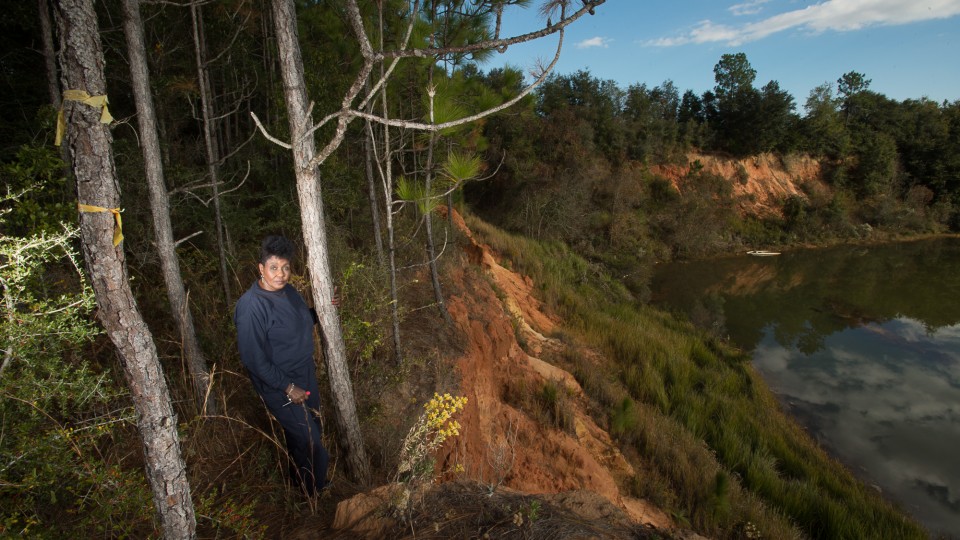Wedgewood million-dollar question has no answer
- November 26, 2014
- / Shannon Nickinson
- / economy

Closing the pits may just be the beginning.
It is clear from Monday’s meeting hosted by State Rep. Mike Hill that the residents of Wedgewood want the pits and landfills in their neighborhood closed.
As far as they have come in the past several months toward raising awareness, there is still far to go.
For the moment, most of the conversation is centered on the new rules county officials are looking to put in place to more tightly regulate how borrow pits, debris pits and landfills are permitted and managed.
“Close the dump” is the mantra of the neighbors of the Wedgewood area, who for decades have lived with the noise, the dust, the smell of rotten eggs and the sting that hydrogen sulfide gas causes in their eyes, noses and throats.
Not to mention the diesel fumes from trucks that run on residential roads.
The coughing and breathing problems.
The worries about whether it is safe to plant a garden and eat what grows from that soil.
The wondering about whether the groundwater contamination that is permissible under the boundaries of a construction and demolition debris pit is migrating toward private wells and drinking water.
The prevalence of cancer among friends and family, which they feel as a malevolent presence that stalks the neighborhood.
Now it seems that thanks in large part to the efforts of County Commissioner Lumon May, their complaints are being heard and taken seriously.
But closing the dumps is only one step.
Wedgewood residents often cite the closure of Saufley Landfill as proof that government can act when it is clear the public health and safety is at issue.
But Saufley was abandoned by its owners. And after county and state officials tried to force the owners to pay for the cleanup, they claimed bankruptcy and disappeared.
The money to cover costs of closing Saufley Landfill — $7,837,504.78 as of Nov. 25, all from local option sales tax funds — came from county coffers.
Closing a landfill like Saufley means more than padlocking the gates and preventing it from taking one more truckload of wallboard and two-by-fours.
It means, as Commissioner Wilson Robertson pointed out Monday, paying to monitor the site after it’s closed, capping it, controlling erosion, monitoring the groundwater. Maybe even paying to haul away material that is already there after the gates close.
One of the Wedgewood facilities has $600,000 in a bond set aside to cover closure costs, something every such facility must prove to Florida DEP it has annually.
Robertson, who has firsthand experience in the matter of the Saufley landfill, told Rep. Hill he was concerned about that dollar figure being enough to do the job.
“(And) If you are going to do it (close a facility), do it right,” Robertson said.
But as Saufley shows, sometimes that means a county has to do it alone.
Fellow Commissioner Steve Barry picked up on that thread. Let’s say, hypothetically, that the bond on a hypothetical landfill isn’t enough to cover the cost of closing it.
Barry asked DEP’s Shawn Hamilton if the county could count on financial help from “our state partners” should it come to closing one or more of the Wedgewood facilities.
“We don’t have the money to close multiple pits,” Barry said. “If there is a gap, does it have to fall to the county?”
Hamilton was prevented from answering about specific sites because DEP is in legal action with the owners of three pits in the neighborhood.
“My focus is on keeping it in compliance so we don’t get to a Saufley,” Hamilton said.
Which leaves the million-dollar question — as it were — still hanging out there.
 CivicCon launches with a look at good growth in cities
CivicCon launches with a look at good growth in cities
 Building stronger brains one baby, one parent at a time
Building stronger brains one baby, one parent at a time
 SCI debuts commercial on Early Learning City
SCI debuts commercial on Early Learning City
 Entrecon: World class speakers and an opportunity to sharpen skills
Entrecon: World class speakers and an opportunity to sharpen skills
 PYP Quality of Life survey 2017
PYP Quality of Life survey 2017
 EntreCon Pensacola 2016: A look back
EntreCon Pensacola 2016: A look back
 Leadership tip: getting better employee takeaways
Leadership tip: getting better employee takeaways
 Leadership tip: be interested instead of interesting
Leadership tip: be interested instead of interesting
 Leadership tip: delivering difficult messages
Leadership tip: delivering difficult messages
 Brain Bags boost Arc, Early Childhood Court programs
Brain Bags boost Arc, Early Childhood Court programs